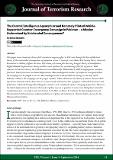Files in this item
The Central Intelligence Agency’s armed Remotely Piloted Vehicle-supported counter-insurgency campaign in Pakistan – a mission undermined by unintended consequences?
Item metadata
| dc.contributor.author | Bennett, Simon | |
| dc.date.accessioned | 2014-10-29T16:38:12Z | |
| dc.date.available | 2014-10-29T16:38:12Z | |
| dc.date.issued | 2014-09-01 | |
| dc.identifier.citation | Bennett, S. (2014). The Central Intelligence Agency’s armed Remotely Piloted Vehicle-supported counter-insurgency campaign in Pakistan – a mission undermined by unintended consequences? Journal of Terrorism Research, 5(3), pp. 14-30. | en_US |
| dc.identifier.issn | 2049-7040 | en_US |
| dc.identifier.uri | http://ojs.st-andrews.ac.uk/index.php/jtr/article/view/943 | en_US |
| dc.identifier.uri | https://hdl.handle.net/10023/5614 | |
| dc.description.abstract | This paper views America's 'drones-first' counter-insurgency effort in Pakistan through the lens of Merton's theory of the unintended consequences of purposive action. It also references Beck’s Risk Society thesis, America’s Revolution in Military Affairs doctrine, Toft’s theory of isomorphic learning, Langer’s theory of mindfulness, Highly Reliable Organisations theory and the social construction of technology (SCOT) argument. With reference to Merton’s theory, the CIA-directed armed Remotely Piloted Vehicle (RPV) campaign has manifest functions, latent functions and latent dysfunctions. Measured against numbers of suspected insurgents killed, the campaign can be judged a success. Measured against the level of collateral damage or the state of US-Pakistan relations, the campaign can be judged a failure. Values determine the choice of metrics. Because RPV operations eliminate risk to American service personnel, and because this is popular with both US citizens and politicians, collateral damage (the killing of civilians) is not considered a policy-changing dysfunction. However, the latent dysfunctions of America's drones-first policy may be so great as to undermine that policy's intended manifest function – to make a net contribution to the War on Terror. In Vietnam the latent dysfunctions of Westmoreland’s attritional war undermined America’s policy of containment. Vietnam holds a lesson for the Obama administration. | en_US |
| dc.language.iso | en | en_US |
| dc.publisher | Centre for the Study of Terrorism and Political Violence, University of St Andrews | en_US |
| dc.relation.ispartof | Journal of Terrorism Research | en_US |
| dc.rights | This is an open access article published in Journal of Terrorism Research. This work is licensed under a Creative Commons Attribution 3.0 License (http://creativecommons.org/licenses/by/3.0/) | en_US |
| dc.rights.uri | http://creativecommons.org/licenses/by/3.0/ | |
| dc.subject | RPV | en_US |
| dc.subject | War on Terror | en_US |
| dc.subject | CIA | en_US |
| dc.subject | Pakistan | en_US |
| dc.subject | Merton | en_US |
| dc.subject | Dysfunctions | en_US |
| dc.subject.lcc | HV6431 | en_US |
| dc.subject.lcsh | Terrorism | en_US |
| dc.title | The Central Intelligence Agency’s armed Remotely Piloted Vehicle-supported counter-insurgency campaign in Pakistan – a mission undermined by unintended consequences? | en_US |
| dc.type | Journal article | en_US |
| dc.description.version | https://doi.org/Publisher PDF | en_US |
| dc.publicationstatus | Published | en_US |
| dc.status | Peer reviewed | en_US |
| dc.identifier.doi | https://doi.org/http://doi.org/10.15664/jtr.943 | en |
This item appears in the following Collection(s)
Except where otherwise noted within the work, this item's licence for re-use is described as This is an open access article published in Journal of Terrorism Research. This work is licensed under a Creative Commons Attribution 3.0 License (http://creativecommons.org/licenses/by/3.0/)
Items in the St Andrews Research Repository are protected by copyright, with all rights reserved, unless otherwise indicated.


